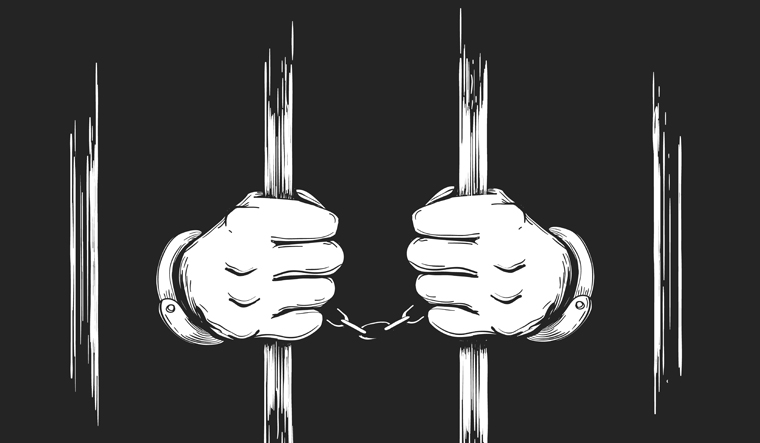Eleven former policemen from Rajasthan were sentenced to life imprisonment for the killing of a sitting MLA, Man Singh in 1985 by a court in Mathura today.
It took almost 90 judges and 35 years for the judgement to come in a case which is probably the first ever in the country when a legislator was killed by the police.
The eleven guilty were punished with a fine of Rs 1,000 and a two year jail term under Section 148 of the Indian Penal Code (IPC) and for life imprisonment with a fine of Rs 10,000 under Sections 149 and 302. The first section is for rioting, the second for unlawful assembly and the third for murder.
Three other policemen who had been charged with forging diary entries had been acquitted on Tuesday.
Singh, scion of the erstwhile ruling family of Bharatpur, had been a seven time MLA from 1952 to 1985 from the Deegh Vidhan Sabha constituency in Rajasthan. Singh had won the seat as an independent candidate repeatedly. Thus ensuring his defeat was a matter of prestige for the then Congress government of the state. Vijendra Singh was the party’s candidate.
On February 20, the then chief minister of Rajasthan Shiv Charan Mathur was to address a rally in support of the local candidate. This was, according to some news reports of the time, against the understanding between Singh and the Congress. Mathur, as the chief minister, was not to campaign in the constituency leaving it to the former royals.
In the run up to the rally, Congress workers had affixed a party flag on the highest dome of the Bharatpur castle, replacing the ex-ruling family’s insignia which had on it an imprint in the likeness of the Hindu god Hanuman and the sun.
When news of that act reached Singh, he was furious. He took to his jeep—a sturdy variety manufactured especially for use by the Indian Army—and headed to the Parade Ground, the venue of the rally. There, he rammed his jeep into the helicopter that had brought Mathur to the ground. The pilot who was in the chopper jumped out just as the high impact collision happened. Singh then turned his jeep towards the stage and rammed into it, causing it to topple. Mathur had already finished his address at the rally and was on his way to the Circuit House where he received this information.
On Mathur’s directive a FIR was lodged against Singh and his associates under Section 307 of the IPC for attempt to murder.
The next day, that is February 21, the local police received news that Singh was at the wholesale grain market in Deegh. According to the police version, the news came with the tip off that Singh was planning something in the nature of what had happened a day earlier. Aware of Mathur’s instruction that strict action be taken in the February 20 incident, a team led by Deputy Superintendent of Police Kahn Singh Bhati reached the spot. Onlookers would later report that the police jeep rammed into Singh’s vehicle. The police version was that they asked Singh to stop his vehicle but he refused. In the ensuing face off, bullets were fired and Singh and two of his associates, Sumer Singh and Hari Singh grievously injured. They died a while later while being taken to a hospital.
Mathur was close to Indira Gandhi but as the protests continued and the prospect of the party losing the substantial Jat vote in the area grew, there were demands in the party to drop him. Mathur had then said that the incident at the rally ground was born of a misunderstanding and that he had told the local administration to put him in touch with Singh who he described as a ‘good friend’. That conversation never happened and 17 days after Singh’s death, Mathur resigned.
Meanwhile, the police registered cases against Vijay Singh Sirohi and others under Section 307 in the market place encounter. It was Sirohi, the son-in-law of Singh, who would later file the FIR against the police.
Initial inquiry into the matter was conducted by the Rajasthan police after which it was handed over to the CBI. In 1985 the agency filed a charge sheet against Bhati and 18 others. One of these was Bhati’s driver Mahendra Singh who was later acquitted. Three of the accused in the case died while the case languished before the court.
Read more
- Dhani Ram Mittal: Posing as judge to free criminals to becoming 'station master', an unparalleled career in crime
- ‘Those who can’t win elections take Rajya Sabha route’: Modi targets Sonia in Rajasthan
- Murder at Karnataka college campus: 5 things to know as 'jilted lover' stabs Congress leader's daughter to death in Hubballi
- Public smoking leads to murder in Pune; youth stabbed for staring at women with cigarettes
Till 1989 the case was heard in Rajasthan after which it was transferred to the District and Sessions court in Mathura on the appeal of the petitioner.
Singh’s political legacy was taken forward by his daughter Krishnendra Kaur Deepa who was elected four times to the Vidhan Sabha and once to the Lok Sabha on BJP tickets. She was also minister of tourism in the state government under Vashundra Raje.
Mathur meanwhile went on to become chief minister again in 1998. In the cabinet he then formed, he gave a ministerial berth to an MP. That politician who failed to keep his post as he could not be elected to the Vidhan Sabha within six months was Ashok Gehlot—now the chief minister of Rajasthan.
Mathur died in 2009, while serving as Governor of Assam.



